May 13, 2025 | 06:32 GMT +7
May 13, 2025 | 06:32 GMT +7
Hotline: 0913.378.918
May 13, 2025 | 06:32 GMT +7
Hotline: 0913.378.918
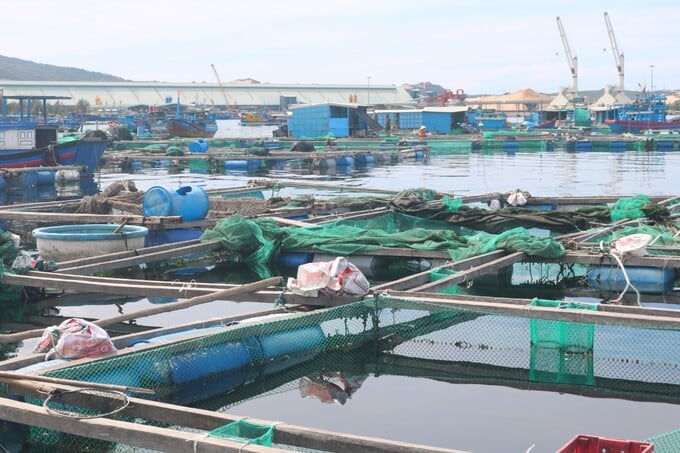
Aquaculture cages are seen in Dam Mon village, Van Thanh Commune, Khanh Hoa Province. Photo: KS.
The cage aquaculture area in Dam Mon village, Van Thanh Commune, Van Ninh District in the south central province of Khanh Hoa is very cramped with fishing cages tightly close to each other.
Local fishermen said that the environment in farming areas is increasingly degraded. Cages for shrimp and fish farming are expanding, obstructing water circulation.
Moreover, wastes such as shrimp carcasses, fish, leftovers are not treated, thus polluting water sources. Meanwhile, the water environment is very important as it is one of the factors determining the success or failure of shrimp farming.
Pham Thanh Thai, a shrimp farmer in Dam Mon village, said that some farmers collected dead shrimp, fish and leftover food and brought them to the shore for treatment. However, other farmers did not, leaving them disposed of at the farming area, thus affecting the general environment of the farming area. Along with that, the density of farmers' cages has expanded a lot.
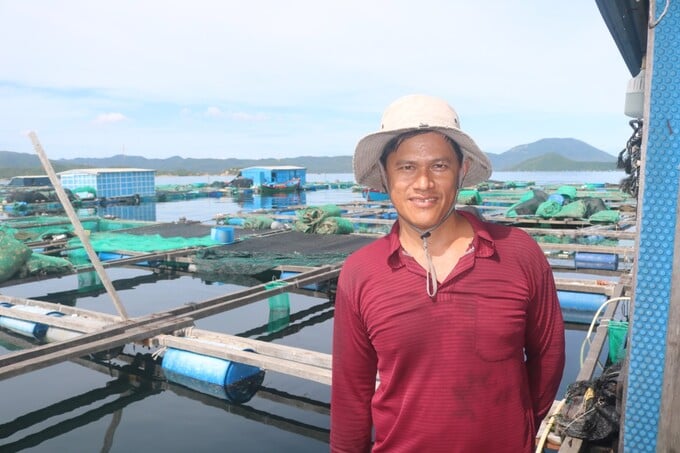
Pham Thanh Thai, a fish farmer with cages in Dam Mon village, Van Thanh commune, said that in the past there were much fewer fishing cages. Photo: KS.
Not only Dam Mon farming area, other farming areas in Van Ninh district are also overloaded. According to Decision No. 1788 dated in 2018 by Khanh Hoa Provincial People's Committee about the provincial fisheries development planning to 2025 and vision to 2035, Van Ninh district has six farming areas, with a total area of 500 ha of water surface and only about 12,500 cages are expected.
However, according to Pham Ngoc Luyen, deputy head of the Economic Division of Van Ninh district, the district currently has nearly 39,000 cages, with more than 1,240 aquaculture households.
Vo Khac En, Deputy Head of Khanh Hoa Fisheries Sub-Department, said that the number of cages had increased sharply because farmers spontaneously expanded their farms.
The increase of cages obstructed the flow of water. Moreover, the cages were not cleaned regularly, polluting the farming environment and possibly killing shrimp and fish due to lack of oxygen, En said.
According to the Research Institute of Aquaculture III, the results of environmental monitoring in brackish water shrimp/lobster farming areas in the South Central provinces in the period 2015-2021 show that from April to June every year, there is often hot and sunny weather, alternating with unseasonal rains, causing great changes to the environment in the provinces.
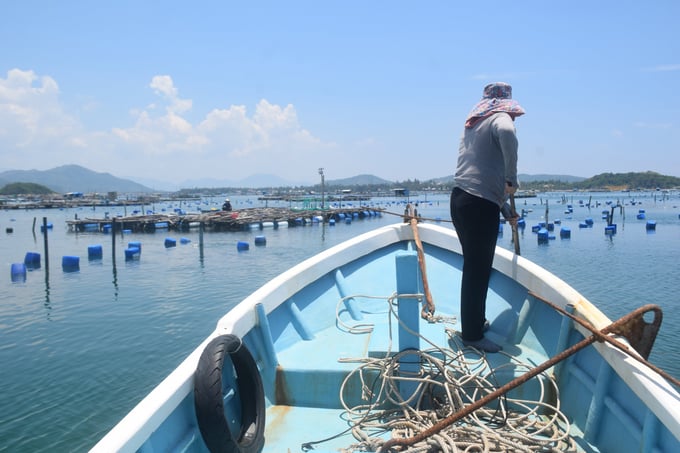
Farmers have noticed that the water environment in the farming area is decreasing day by day. Photo: VDT.
Nguyen Van Vung, a lobster farmer in Xuan Yen Ward, Song Cau Town, Phu Yen Province said that in the past, shrimp farming cages on Xuan Dai Bay were located close to the seabed, because at that time the water quality was good.
"At that time, the water source for farming was still good enough and the density of farming was low, so even though it was close to the seabed, shrimp still developed normally. Now the cages are only about 3-4m apart, they are allowed to float only about two metres from the water surface to avoid pollution," he said, adding that if the shrimp was raised close to the seabed like previously, they would die because of lacking oxygen.
“Every day, shrimp farmers have to spend two or three hours on cleaning the cages. When cleaning the cages, the farmers observe the shrimp and find if any of them have signs of illness. If any diseased shrimp are detected, they should be taken out and put in another cage to monitor. After cleaning the cages, the farmer started pouring the food into plastic tubes that are used to feed the shrimp. They usually feed the shrimp once a day in the morning,” Vung said.
The figures of the authorities show that lobster farming in this province does not follow planning. Phu Yen only plans to raise lobster farming areas with only 49,000 cages. However, according to the latest data of localities, up to now, the number of cages in this province has reached nearly 100,000 cages, mainly in Xuan Dai bay (Song Cau town) with about 79,590 cages, 2.4 times higher than planned.
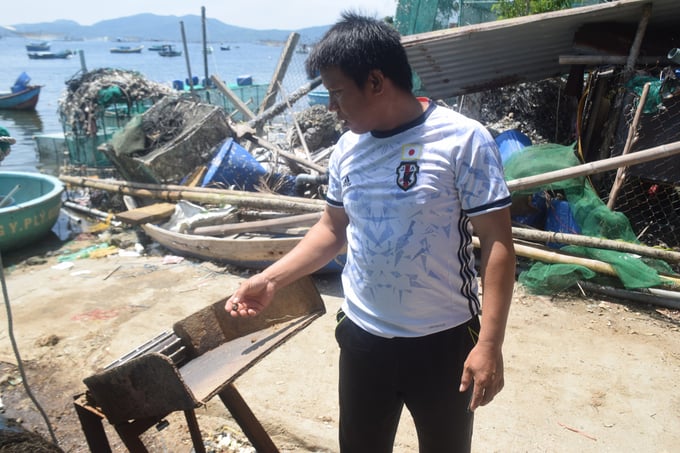
Shrimp farmer Nguyen Van Vung in Xuan Yen ward, Song Cau town, Phu Yen province prepares to grind snails to feed shrimp. Photo: VDT.
Nguyen Tri Phuong, Deputy Director of Phu Yen Department of Agriculture and Rural Development, said that the cause of the deterioration of the environment was a long process of more than 30 years of aquaculture development. Although the province had a planning for aquaculture areas including lagoons, bays, estuaries, downstream and even near-shore coastal areas.
However, the planning is not strictly managed by the relevant localities, departments and branches. Many farming households do not comply with environmental management, for example, they directly discharge waste including leftovers, plastic bags into the environment.
To warn about the water environment in aquaculture, every year in addition to the environmental monitoring plan implemented by the Aquaculture Research Institute III, the provincial Agriculture and Rural Development also advise the province to approve the plan for disease surveillance and environmental monitoring in advance. When the results of the water environment assessment are available, the authorities will notify the farmers, community groups, communes, wards and specialized agencies. Farmers would be instructed to actively manage their farms.
Nguyen Tri Phuong, Deputy Director of Phu Yen Department of Agriculture and Rural Development said that according to scientists, the environmental capacity in Xuan Dai Bay can only guarantee a density of about 20,000 cages. However, the current number of cages has doubled, causing difficulties to ensure sustainable aquaculture development.
Translated by Hien Anh

(VAN) Use of high-quality broodstock and biotechnology is regarded as the most effective approach to ensuring sustainable and economically viable shrimp aquaculture ahead of climate change and the emergence of increasingly intricate disease patterns.

(VAN) Carbon farming is a form of agricultural practices that helps absorb more greenhouse gases than it emits, through smart management of soil, crops, and livestock.

(VAN) This is a key content of the Memorandum of Understanding recently signed between the Vietnam Fisheries Society and Kunihiro Inc of Japan.

(VAN) To achieve the goal, local authorities and businesses in Kon Tum province have fully prepared the necessary conditions for the new Ngoc Linh ginseng planting season.
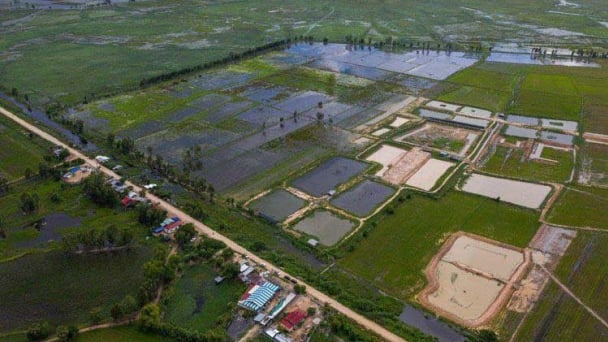
(VAN) Jiangsu province is gearing up to host training programs in Phnom Penh, the capital of Cambodia, this year to establish the Fish and Rice Corridor.
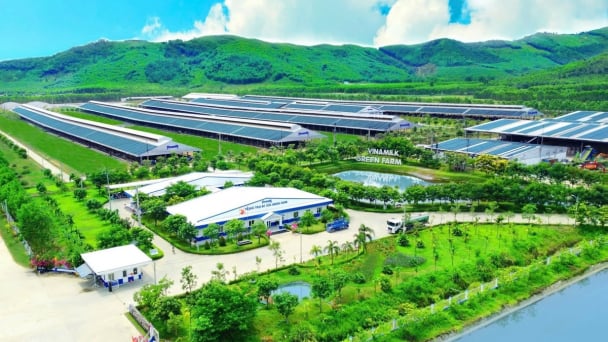
(VAN) Le Hoang Minh, representing Vinamilk, shared the company's experience in energy saving and green energy transition for production at a workshop held during the P4G Summit.
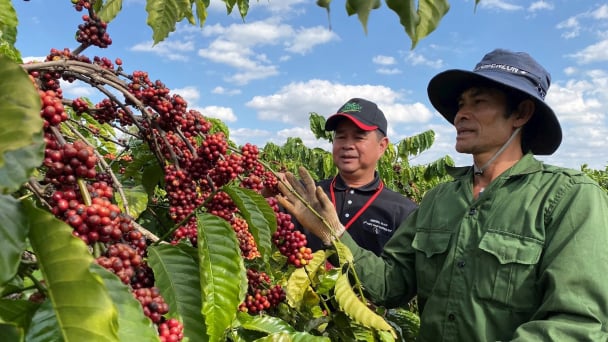
(VAN) Businesses emphasize fairness and equality when integrating social factors into their sustainable development strategies.